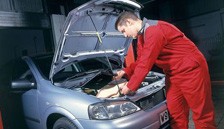The Government is likely to review the annual MoT test and scheduling could be moved to match the rest of Europe which has the first test when a new car is four years old and subsequent tests every two years.
The MoT industry is annually worth £465 million to the automotive sector, so halving the schedule would not only financially impact dealers, but would also raise significant safety issues.
The Department for Transport is considering the options, including the possibility of linking the MoT to a car’s mileage.
According to the DfT the most common reason for cars failing the MoT test was with the lighting and signalling systems.
In 2009/10 21% of all car tests failed for this reason. Other common defects on cars include brakes, suspension and tyres.
These defects are the most common across the other vehicle types as well. Over 27.6 million MoT tests were carried out in the last 12 months.
Road Safety minister Mike Penning said: “The MoT test plays an important role in making sure vehicles are roadworthy and should strike the right balance between vehicle safety and the burden imposed on motorists.
“We intend to undertake a review of the MoT testing regime, but have made no decisions about any changes to the system.”
Neil Greig, Institute of Advanced Motorists director of policy and research, has called for an investigation into the 21% MoT failure rate on three year old cars before any changes are made to test scheduling.
Greig said: “With MoT failure rates of around 21% for three-year-old cars, it is essential that the underlying reasons for so many relatively new cars failing are investigated before any changes are made to MoT test frequency.”
Peter Harris, Peter James Motor Group managing director, said: “The main problem is with safety.
“We see a lot of people that need tyres and brakes replacing when they come in for their MoT and that’s often the cause of failure.
“If the MoT period gets extended customers will just put off replace-ment of those items even longer, they won’t proactively get them sorted. That’s going to lead to a lot of unsafe cars on the road.
“Businesses will lose out on MoTs, but they will also lose out on servicing. I think we’ll see people putting off their servicing until the MoT is due.”
Aftersales losses
Chris Roberts, Thurlby Motors managing director, said: “It would take a huge chunk out of aftersales business across the group.
“I don’t think the scheduling needs to change, but if it did, linking the test to mileage would be a better option than moving to 4-2-2.
“However, even linking it to mileage will still raise safety issues with cars declared SORN and it doesn’t cater for cars that have structural damage from things like rust.”
Penning said: “This is not about Europe saying we have to go to four years and two. What I’m trying to look at is ensuring we have safe cars on the road depending on the mileage they have done.”
He talked about matching the timing of the test to the mileage on the car, questioning the sense of “company cars that may have done up to 100,000 miles and commercial vehicles double that before they have their first MoT test”.
Penning said he was talking to the industry, including the Retail Motor Industry (RMI), about “not taking cars away from test centres, but get them there at the right time”.
John Ball, RMI MoT chairman said: “Should the coalition government take on the European minimum standard of MoT frequency in the UK, it will directly result in 40,000 job losses across the UK.
Threat to safety
“The last Government dropped the idea because of the huge threat to road safety – if done today its impact would be even more devastating due to the recession.
“We believe there are a number of positive changes that could be made to the MoT scheme to improve the safety of vehicles; moving to two year testing, however, is not one of them.
For this reason we urge the Minister to steer clear of the EU minimum to protect both jobs and the lives of UK motorists.”
The independent repairers’ sector would take the largest hit if the MoT moved to a 4-2-2 schedule.
Mike Owen, head of the Independent Aftermarket Association Federation – Garages, said: “Quite simply the effect on the independent garage sector would be devastating as the majority of MoT stations are from this sector.
“Testing itself is such a tightly controlled discipline time-wise that the effect would be immediate.
“The disastrous scrappage programme has already had a measurable effect removing more than a million tests in the next three years and 4-2-2 would be yet another detrimental action against the sector by respective Governments.”














Login to comment
Comments
No comments have been made yet.